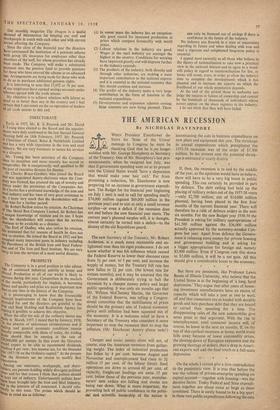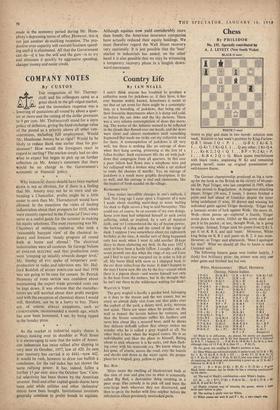THE AMERICAN RECESSION
By NICHOLAS DAVENPORT WHEN President Eisenhower de- livers his 'State of the Union'
/ \ message to Congress he must be
thanking God that he is .no longer saddled with Mr. George Humphrey as Secretary of the Treasury. One of Mr. Humbhrey's last pro- nouncements, when he resigned last July, was that if government spending went on at its present rate the United States would 'have a depression that would make your hair curl.' Far from promising a reduction, Mr. Eisenhower is now preparing for an increase in government expendi- ture. The Budget for the financial year beginning on July 1 next is said to call for spending nearly $74,000 million (against $69,000 million in the previous year) and to aim at only a small revenue surplus—or even a deficit if the recession does not end before the new financial year starts. The current year's planned surplus will, it is thought, almost certainly be turned into a deficit—to the dismay of the old Republican guard.
The new Secretary of the Treasury, Mr. Robert Anderson, is a much more reasonable and en- lightened man than his rigid predecessor. I do not know whether it was his influence which caused the Federal Reserve to lower their discount rates from 3i per cent. to 3 per cent, and increase the supply of money, but the Treasury bill rate has now fallen to 21 per cent. (the lowest rate for sixteen months), and it may be assumed that the Government is deliberately trying to halt the recession by a cheaper money policy and larger public spending. It was only six months ago that Mr. William McChesney Martin, the Governor of the Federal Reserve, was telling a Congres- sional committee that the stabilisation of prices should be the primary aim of Federal economic policy until inflation had been squeezed out of the economy. It is a welcome relief to have a Secretary of the Treasury who considers it more important to stop the recession than to stop the inflation. (Mr. Heathcoat Amory please note!) Cheaper and easier money alone will not, of course, stop the American recession from gather- ing weight. The index of industrial production has fallen by 4 per cent. between August and November and unemployment had risen to 31 million (5 per cent. of the labour force). Steel operations are down to around 60 per cent, of capacity, freight-car loadings are some 15 per cent. below those of the previous year, manufac- turers' new orders are falling and stocks are being run down. What is more important, the prevailing lack of public confidence in the politi- eal and scientific leadership of the nation is accentuating the cuts in business expenditures on new plant and equipment this year. The shrinkage in annual expenditures which precipitated the 1953-54 recession was of the order of $7,500 million. In the present case the potential shrink- age is estimated at nearly double.
If, then, the recession is to end by the middle of the year, as the optimists would have us believe, there will have to be a very big boost in public spending. This can certainly be provided in part by defence. The debt ceiling had held up the placing of military orders out of the 1957-58 votes —only $2,700 million, out of $14,000 million planned, having been placed in the first four months of the current financial year. There will therefore be a rush of defence orders in the next six months. For the new Budget year 1958-59 the President is asking for military appropriations of $41,500 million against the $36,000 million actually approved by the economy-minded Con- gress last year. Apart from defence the Govern- ment is releasing more money for private housing and government building and is asking for a bigger appropriation for foreign aid, namely $3,900 million. Even if Congress cuts this down to $3,000 million, it will be a net gain. All this should give a considerable boost to the economy.
But there are pessimists, like Professor Lewis Bassie of Illinois University, who believe that the United States is at the beginning of 'a long, hard depression.' They argue that after years of boom- ing investment manufacturers have an excess of capacity which will take a year or two to work off and that consumers are so loaded with durable goods and hire-purchase debt that they are bound to curtail their spending for a time. The disappointing sales of the new automobiles give some point to that argument. With the rise in unemployment, total consumer income will, of course, be lower in the next six months. If, on the top of this cyclical recession at home, world trade falls away because of lower commodity prices, the slowing-down of European expansion and the growing shortage of dollars, then a drop in Ameri- can exports will add the final touch to a full-scale depression.
* On the whole I cannot give a firm contradiction to the pessimistic view. It is true that before the war the volume of private-enterprise spending on capital account— together with housing—was the decisive factor. Today Federal and State expendi- tures together are about twice as large as these combined. There is surely bound to be a big spurt in these vast public expenditures following the cuts made in the economy period during Mr. Hum- phrey's depressing terms of office. However, this is not just another de-stocking recession. The pro- ductive over-capacity will restrain business spend- ing until it is eliminated. All that the Government can do—if it has the will and the guts—is to try and eliminate it quickly by aggressive spending, cheaper money and easier credit.
Although equities now yield considerably more than bonds, the American insurance companies have actually reduced their equity holdings. We must therefore regard the Wall Street recovery very cautiously. It is just possible that the 'bear' market in industrials has ended; on the other hand it is also possible that we may be witnessing a temporary recovery phase in a longish down- ward movement.



































 Previous page
Previous page